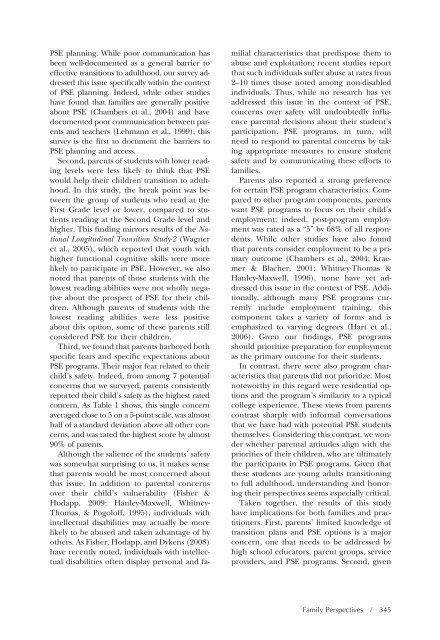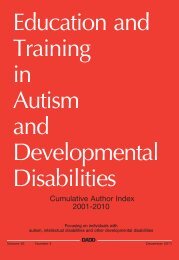Education and Training in Autism and Developmental Disabilities
Education and Training in Autism and Developmental Disabilities
Education and Training in Autism and Developmental Disabilities
You also want an ePaper? Increase the reach of your titles
YUMPU automatically turns print PDFs into web optimized ePapers that Google loves.
PSE plann<strong>in</strong>g. While poor communication has<br />
been well-documented as a general barrier to<br />
effective transitions to adulthood, our survey addressed<br />
this issue specifically with<strong>in</strong> the context<br />
of PSE plann<strong>in</strong>g. Indeed, while other studies<br />
have found that families are generally positive<br />
about PSE (Chambers et al., 2004) <strong>and</strong> have<br />
documented poor communication between parents<br />
<strong>and</strong> teachers (Lehmann et al., 1999), this<br />
survey is the first to document the barriers to<br />
PSE plann<strong>in</strong>g <strong>and</strong> access.<br />
Second, parents of students with lower read<strong>in</strong>g<br />
levels were less likely to th<strong>in</strong>k that PSE<br />
would help their children transition to adulthood.<br />
In this study, the break po<strong>in</strong>t was between<br />
the group of students who read at the<br />
First Grade level or lower, compared to students<br />
read<strong>in</strong>g at the Second Grade level <strong>and</strong><br />
higher. This f<strong>in</strong>d<strong>in</strong>g mirrors results of the National<br />
Longitud<strong>in</strong>al Transition Study-2 (Wagner<br />
et al., 2005), which reported that youth with<br />
higher functional cognitive skills were more<br />
likely to participate <strong>in</strong> PSE. However, we also<br />
noted that parents of those students with the<br />
lowest read<strong>in</strong>g abilities were not wholly negative<br />
about the prospect of PSE for their children.<br />
Although parents of students with the<br />
lowest read<strong>in</strong>g abilities were less positive<br />
about this option, some of these parents still<br />
considered PSE for their children.<br />
Third, we found that parents harbored both<br />
specific fears <strong>and</strong> specific expectations about<br />
PSE programs. Their major fear related to their<br />
child’s safety. Indeed, from among 7 potential<br />
concerns that we surveyed, parents consistently<br />
reported their child’s safety as the highest rated<br />
concern. As Table 1 shows, this s<strong>in</strong>gle concern<br />
averaged close to 5 on a 5-po<strong>in</strong>t scale, was almost<br />
half of a st<strong>and</strong>ard deviation above all other concerns,<br />
<strong>and</strong> was rated the highest score by almost<br />
90% of parents.<br />
Although the salience of the students’ safety<br />
was somewhat surpris<strong>in</strong>g to us, it makes sense<br />
that parents would be most concerned about<br />
this issue. In addition to parental concerns<br />
over their child’s vulnerability (Fisher &<br />
Hodapp, 2009; Hanley-Maxwell, Whitney-<br />
Thomas, & Pogoloff, 1995), <strong>in</strong>dividuals with<br />
<strong>in</strong>tellectual disabilities may actually be more<br />
likely to be abused <strong>and</strong> taken advantage of by<br />
others. As Fisher, Hodapp, <strong>and</strong> Dykens (2008)<br />
have recently noted, <strong>in</strong>dividuals with <strong>in</strong>tellectual<br />
disabilities often display personal <strong>and</strong> fa-<br />
milial characteristics that predispose them to<br />
abuse <strong>and</strong> exploitation; recent studies report<br />
that such <strong>in</strong>dividuals suffer abuse at rates from<br />
2–10 times those noted among non-disabled<br />
<strong>in</strong>dividuals. Thus, while no research has yet<br />
addressed this issue <strong>in</strong> the context of PSE,<br />
concerns over safety will undoubtedly <strong>in</strong>fluence<br />
parental decisions about their student’s<br />
participation. PSE programs, <strong>in</strong> turn, will<br />
need to respond to parental concerns by tak<strong>in</strong>g<br />
appropriate measures to ensure student<br />
safety <strong>and</strong> by communicat<strong>in</strong>g these efforts to<br />
families.<br />
Parents also reported a strong preference<br />
for certa<strong>in</strong> PSE program characteristics. Compared<br />
to other program components, parents<br />
want PSE programs to focus on their child’s<br />
employment; <strong>in</strong>deed, post-program employment<br />
was rated as a “5” by 68% of all respondents.<br />
While other studies have also found<br />
that parents consider employment to be a primary<br />
outcome (Chambers et al., 2004; Kraemer<br />
& Blacher, 2001; Whitney-Thomas &<br />
Hanley-Maxwell, 1996), none have yet addressed<br />
this issue <strong>in</strong> the context of PSE. Additionally,<br />
although many PSE programs currently<br />
<strong>in</strong>clude employment tra<strong>in</strong><strong>in</strong>g, this<br />
component takes a variety of forms <strong>and</strong> is<br />
emphasized to vary<strong>in</strong>g degrees (Hart et al.,<br />
2006). Given our f<strong>in</strong>d<strong>in</strong>gs, PSE programs<br />
should prioritize preparation for employment<br />
as the primary outcome for their students.<br />
In contrast, there were also program characteristics<br />
that parents did not prioritize. Most<br />
noteworthy <strong>in</strong> this regard were residential options<br />
<strong>and</strong> the program’s similarity to a typical<br />
college experience. These views from parents<br />
contrast sharply with <strong>in</strong>formal conversations<br />
that we have had with potential PSE students<br />
themselves. Consider<strong>in</strong>g this contrast, we wonder<br />
whether parental attitudes align with the<br />
priorities of their children, who are ultimately<br />
the participants <strong>in</strong> PSE programs. Given that<br />
these students are young adults transition<strong>in</strong>g<br />
to full adulthood, underst<strong>and</strong><strong>in</strong>g <strong>and</strong> honor<strong>in</strong>g<br />
their perspectives seems especially critical.<br />
Taken together, the results of this study<br />
have implications for both families <strong>and</strong> practitioners.<br />
First, parents’ limited knowledge of<br />
transition plans <strong>and</strong> PSE options is a major<br />
concern, one that needs to be addressed by<br />
high school educators, parent groups, service<br />
providers, <strong>and</strong> PSE programs. Second, given<br />
Family Perspectives / 345

















